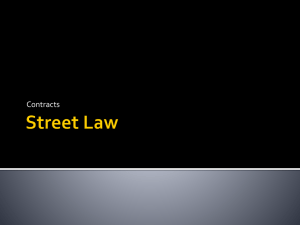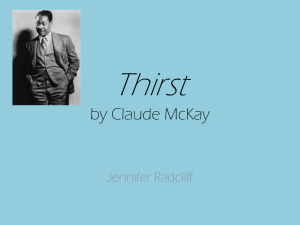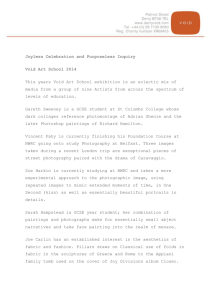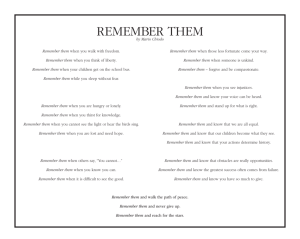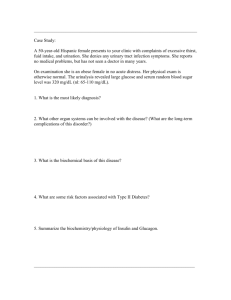Nasrudin's Theory of Neurosis
advertisement
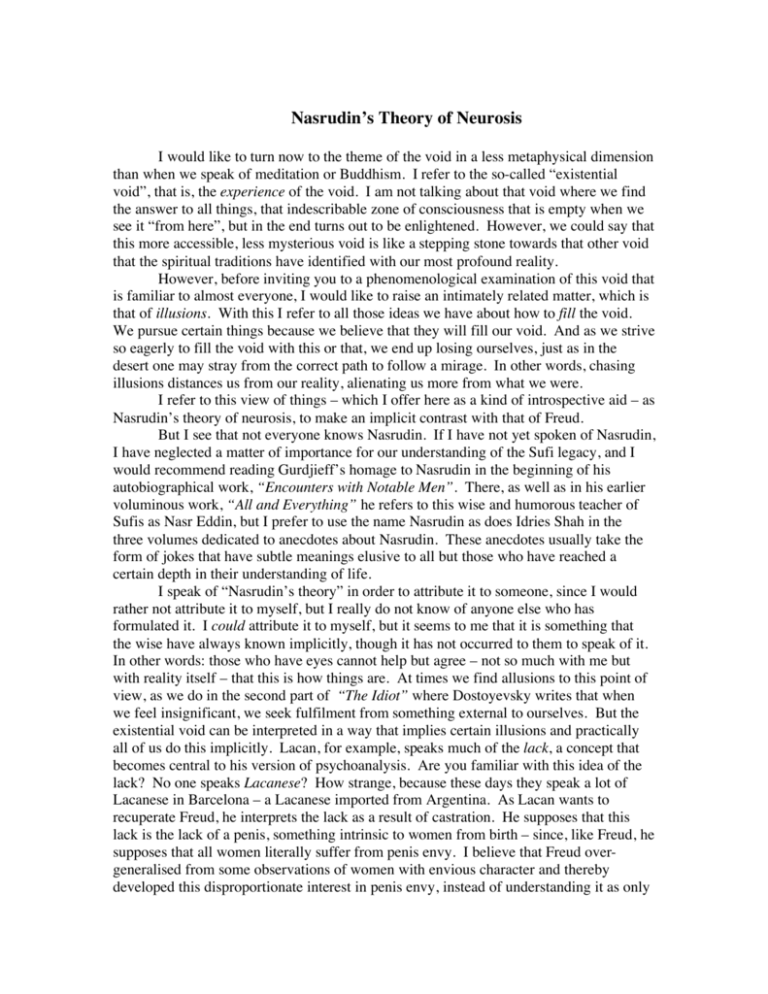
Nasrudin’s Theory of Neurosis I would like to turn now to the theme of the void in a less metaphysical dimension than when we speak of meditation or Buddhism. I refer to the so-called “existential void”, that is, the experience of the void. I am not talking about that void where we find the answer to all things, that indescribable zone of consciousness that is empty when we see it “from here”, but in the end turns out to be enlightened. However, we could say that this more accessible, less mysterious void is like a stepping stone towards that other void that the spiritual traditions have identified with our most profound reality. However, before inviting you to a phenomenological examination of this void that is familiar to almost everyone, I would like to raise an intimately related matter, which is that of illusions. With this I refer to all those ideas we have about how to fill the void. We pursue certain things because we believe that they will fill our void. And as we strive so eagerly to fill the void with this or that, we end up losing ourselves, just as in the desert one may stray from the correct path to follow a mirage. In other words, chasing illusions distances us from our reality, alienating us more from what we were. I refer to this view of things – which I offer here as a kind of introspective aid – as Nasrudin’s theory of neurosis, to make an implicit contrast with that of Freud. But I see that not everyone knows Nasrudin. If I have not yet spoken of Nasrudin, I have neglected a matter of importance for our understanding of the Sufi legacy, and I would recommend reading Gurdjieff’s homage to Nasrudin in the beginning of his autobiographical work, “Encounters with Notable Men”. There, as well as in his earlier voluminous work, “All and Everything” he refers to this wise and humorous teacher of Sufis as Nasr Eddin, but I prefer to use the name Nasrudin as does Idries Shah in the three volumes dedicated to anecdotes about Nasrudin. These anecdotes usually take the form of jokes that have subtle meanings elusive to all but those who have reached a certain depth in their understanding of life. I speak of “Nasrudin’s theory” in order to attribute it to someone, since I would rather not attribute it to myself, but I really do not know of anyone else who has formulated it. I could attribute it to myself, but it seems to me that it is something that the wise have always known implicitly, though it has not occurred to them to speak of it. In other words: those who have eyes cannot help but agree – not so much with me but with reality itself – that this is how things are. At times we find allusions to this point of view, as we do in the second part of “The Idiot” where Dostoyevsky writes that when we feel insignificant, we seek fulfilment from something external to ourselves. But the existential void can be interpreted in a way that implies certain illusions and practically all of us do this implicitly. Lacan, for example, speaks much of the lack, a concept that becomes central to his version of psychoanalysis. Are you familiar with this idea of the lack? No one speaks Lacanese? How strange, because these days they speak a lot of Lacanese in Barcelona – a Lacanese imported from Argentina. As Lacan wants to recuperate Freud, he interprets the lack as a result of castration. He supposes that this lack is the lack of a penis, something intrinsic to women from birth – since, like Freud, he supposes that all women literally suffer from penis envy. I believe that Freud overgeneralised from some observations of women with envious character and thereby developed this disproportionate interest in penis envy, instead of understanding it as only one aspect of their envy of men. Freud, naturally, insisted on the validity of his sexual theory of neurosis, and it is easy to see that his insistence became somewhat fanatical at times – this is not to deny his genius or that he was one of the great transforming forces in the history of the west. Personally, I believe it is much more acceptable to speak of castration in a more metaphoric than literal sense. It seems natural to think that the sensation of having been castrated as well as that of the lack arise from the inhibition of our desires in the context of our culture and our education; that is, we lack something simply because we are not living our lives, because we are not being who we really are – we are not realising our potential. It might be wise to keep in mind another perspective regarding this sense of lack or wanting – that which tells us that our forgetting of ourselves is nothing more than this: an alienation from, or unconsciousness of, something omnipresent. This is the perspective of Buddhism that reminds us that we are Buddhas without knowing it; or that of Christianity which speaks to us of the Christ within that we do not recognise and that tells us that anyone can reach heaven at the moment of death. To say that heaven is “at hand” is to say that it is within our reach. In less poetic, more scientific language we could say that what is “at hand” is the experience of being – since it is nothing more than that which we truly are. Speaking of Being is approximately the same as speaking of heaven (in Buddhist language the word “Being” is not even used, as all terms for concepts related to the profound reality of consciousness are rejected). Let us say that the key to life and the key to satisfaction with life is “Being”. This is why I attribute to Nasrudin my favourite interpretation of psychopathology – one that I have elaborated through my reflections on existential psychodynamics in Character and Neurosis. Nasrudin searches for the key, and we know where. Is there anyone who does not know where Nasrudin looks for the key? According to the famous joke, he looks for it under a street lamp in the market place. A friend begins to help him and the two of them spend a good while crawling around on hands and knees before it occurs to the friend to ask: “Are you sure you lost it here?”, to which Nasrudin casually replies: “No, I lost it at home”. “But, then why are we looking for it here?” – asks the friend. “Because the light is better here”, comes the great clown’s answer. We are looking for the key not where we really lost it, but where the light is better. We are looking for the key in the wrong place. We look for it where we have been told it could be found or where we can see more clearly. But the key is “at home”, that is: in our own depths, in the dark reaches of our consciousness. And how important it is to look for it well. Have you not heard: “Do not look outside yourself”? When I am in Vitoria I stay in a place across from a park where there is a monument to nothing in particular: it is just a stone from which hang some chains that hold no one, suggesting that whoever was once chained there had got free and gone. There is a plaque that says: “Look within yourself”. This message is omnipresent, and surely every culture has its version of the story of the precious blue bird that is hunted high and low the world over and which the hero of the story ultimately finds in his own garden. I recall on one occasion, at the end of a workshop I had done with Jodorowsky in Mexico, he asked me to end the encounter with some piece of advice for the participants, my words were: “You have to search and search and search furiously before you come to the realisation that one has to go home and find that which did not need to be searched for.” It is a great paradox of this life that one cannot skip the search, and that only after having exhausted the search can one know that the thing searched for is oneself. It does not help to say “Search within yourself” when you have not exhausted the search in the world of mirages and illusions. But we can speed up this run through the labyrinth of mirages with an understanding that the illusions are illusions and for this there is no better compass than that “zero point” that is the experience of the void. In the void in our centre, where we search fruitlessly for our being, lies the key, but, like Nasrudin, we search for the consciousness of our being in the wrong place. There are those, for example, who search for the key in knowledge. This was my case, since in my youth I searched for “the truth” without understanding the vast difference between the truth of Being – that is, what is true in itself – and scientific truth, which consists of an agreement between propositions and facts and is oriented towards the knowledge of things. In this way, at one time in my life, I was searching for the philosopher’s stone through science and this took me to medical school – with the supposition that through knowledge of biology (and later through neurophysiology) I would find the answer to my thirst. But this was a thirst for that which we all seek, whether we know it or not: a thirst for Being. If some err in searching for the truth through science or philosophy, others err by searching through love. This is another “crazy idea”: that through love one is going to find living evidence of one’s existence. Perhaps it does not seem so crazy, nevertheless: because we have lacked love, we intuit that our ailing present state is an echo of that past frustration and we think that by finding love we will also find the balm that will heal our old wounds. But it is not so. What has really happened is that the original lack of love cut us off from our Being, and the act of receiving love now is not sufficient for us to be able to find our lost Being. The lack of love disconnects us from ourselves and deviates us from our path, and the task at hand is not to fill our lack of love nor to cry about the past until some understanding soul gives us what we never had (which is the mistake of depressives and masochists); the task at hand is to get back on the path. If the error of the E5 is a glorification of knowledge and the error of the E4 is a glorification of love, the error of the E2 is, rather than searching for Being in the receiving of love, to search for it in the giving of love. “I have so much to give”, “I need someone to receive my love”, is how the proud E2 feels. And this too entails the erroneous assumption that in the loving act of giving we will find the lost key. In what other ways do we lose our Being? What other mirages do we know of? Prestige….Success. Yes: prestige and success. We would not seek prestige and success so desperately if the neurosis consisted in a simple distortion or in the “vicissitude of instinct” as Freud said. What is certain is that we seek the love that we lack, and sometimes we seek it through applause, without even remembering that it is love that we are seeking in the first place. This is how the E3 is transformed into an instrument of production. “Love me for what I can offer you” or “Love me for my efficiency” seems to be their implicit message. And we could continue around the eneagram from character to character pointing out this or that illusion relating to the search for Being. But instead of entertaining ourselves with the way that a perfectionist tries to fill his void with virtuous acts or how the lustful confuse their thirst for Being with sensory appetites whose intense satisfaction provides a feeling of being alive, I trust that shortly the variety of illusions will be made apparent when the group shares the results of the auto-exam. I think it is clear that we live confused in regard to a fundamental matter and that the moment must come in which we discover our confusion between Being and appearances. We must discover the illusion by virtue of which we believe that what is searched for – to satisfy this metaphysical thirst – can be found in such things as efficiency, applause, pleasure or the fulfilment of duty. In the gospels it is told how Jesus offers a good woman some water that will calm her thirst and here is the allusion, naturally, to this other “water” that promises to satisfy us but fails to do so. This water that does not calm our thirst is that which each of us searches for in our favourite mirage. And it is clear that neurotic needs are insatiable. If you find the glory you seek, for example, you will seek a greater glory forthwith. This is what happened to Napoleon, who was a social E2. His insatiable ambition led him on and on, finally to catastrophe. But there is water of another kind that will calm your thirst, and that is none other than Being – the contact with the depth of our consciousness, with the basic or fundamental consciousness that underlies specific mental phenomena. But I want to leave you with the idea that it is precisely through the mistaken search and the erroneous beliefs about where we might find satisfaction – be this in applause or comfort, or in confusing oneself with another and living symbiotically through that other, etc. – that we come face to face with the void. And if we stayed there, face to face not with our Being, but with the void and if we did not have such horror of the void, this void would, little by little, begin to fill. If you make friends with the void you begin to grow in it; or in other words: if we can tolerate our thirst for Being instead of attempting to satisfy it with our usual substitutes for Being, our void will gradually begin to fill. The experience of the void is something like a return to the womb because there is a gestation precisely during those times when we do not find ourselves. That is, if you stay where there is nothing – if you stay without thought in this calm – the temptation to leave may be great, or the boredom may verge on the intolerable. But, if you are able to do it in spite of the restlessness or the frustrated hunger that makes it seem like a waste of time, then you truly are working for your liberation from illusion and advancing toward a more profound consciousness. This begins like a tiny embryo that must be fed before it can become conscious of itself. In the course of ordinary life the void is a great nuisance and is given little credit. We must begin to realise that not only do we grow by making friends with and tolerating it – that is, not fighting with it or attempting to fill it with something else – but that it transforms into the principle fuel for the search for Being. Normally we seek to satisfy our thirst for Being with all kinds of substitutes without even noticing. It is what moves all of us – regardless of the type of ego, from the most severe and grotesque pathologies to the most subtle – it is the same: it is the desire to fill this void, misunderstanding our search for Being. What moves the alcoholic and what moves the murderer, what moves the cat burglar and the person in need of affection, is all the same; the same thirst misunderstood in different ways. It is the same search that moves us all, but it is important that we arrive at an understanding of its essence. In the last course I had not touched on this theme, but during a regression exercise Rosa’s husband had a profound experience. I never even asked about the specifics of the moment he had recalled, but it had to do with a sexual scene from childhood, and through processing this scene he discovered what I am referring to here as a “metaphysical thirst”. There is a Sufi tale about four travelling companions who are left with just one coin among them and they argue about what to spend it on. One of them is an Arab and he insists on his desire for some inab; another is Greek and wants stafil; the third is a Turk and he would prefer uzum; and the fourth is Persian and would like angur. While their argument is becoming heated, they meet someone who says: “I can resolve your problem. If you give me the coin, I will buy what each of you wants.” Of course, at first they were hesitant in trusting this stranger with their desires, but finally they decided to give him their coin, and the stranger promptly bought a bunch of grapes for them. They were happy: the Arab said, “Here is my inab”; the Greek was content with his stafil; as was the Turk with his uzum and the Persian with his angur. Because, as you might guess, they all wanted grapes, for which each used a different word according to his language. Only the wise man, the Sufi of the story, recognised the metaphysical thirst there, the thirst for thirst, or thirst for the divine, for that which lies beyond its various interpretations. It is this thirst that is translated into the varying psychological idioms of different characters, the diverse experiences of life and people’s diverse levels of experience. If, instead of automatically filling the void, we rise above our customary level of automaticity in which we reach for the next cigarette to calm (never realising how) our metaphysical orality with a physical orality, and if we take consciousness of our thirst for Being, the result is different. If we just permit ourselves to suffer this moment of the internal void, the capacity to experience and tolerate this will bring us, with time, something better than our illusions. While we do not have access to the “supreme filling”, which is the centre of ones own consciousness, it turns out that the longing for it is transformed into things we can reasonably do to be led towards it. Through all manner of spiritual exercises, especially through meditation, we can transform our “egoaddictions” into an addiction to the path to Being, that is, into an interest in living a little better and into the motivation to function in everyday life in a way that accelerates the change. To the extent that through our struggles against the ego we enter a kind of limbo of discouragement where one world has been left behind and the new one has not yet emerged, we can transform our same discouragement into the path and even into the vehicle. We look for our Being out there where it seems we will find it, and in this way we distance ourselves from it; but if, resisting the temptations of such mirages, we are able to stay there and suffer the absence of Being, this permits us to experience in ourselves a kind of existential growth. The point is, then, to let go of this ontic pacifier – or simulacrum of the experience of being – in order to arrive at true Being. This is to say that to reach true life, you must first dare to lose it.
